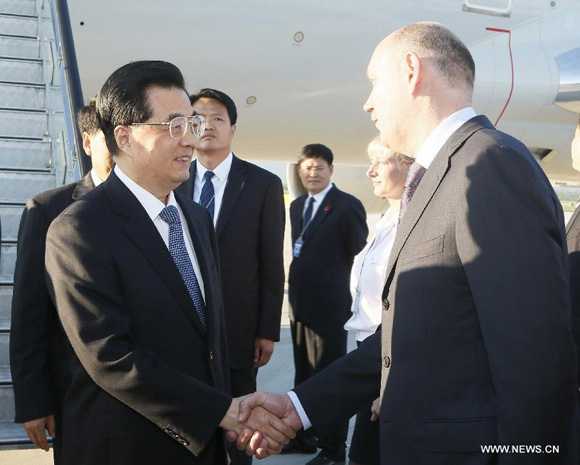APEC sets region as engine of world economic growth
 0 Comment(s)
0 Comment(s) Print
Print E-mail China.org.cn, September 7, 2012
E-mail China.org.cn, September 7, 2012
The Asia Pacific Economic Cooperation (APEC) region would continue to serve as a major engine for the world economy, senior ministers from the bloc agreed on Thursday.
|
|
|
Chinese President Hu Jintao (L, front) is greeted upon his arrival in Russia's Far Eastern city of Vladivostok on Sept. 6, 2012, for the annual economic leaders' meeting of the 21-member Asia-Pacific Economic Cooperation (APEC) forum slated for Saturday and Sunday. |
Foreign affairs and economy ministers from the APEC member countries made the commitment in a joint statement released soon after the two-day 2012 APEC ministerial meeting ended in this Russian Far East city.
"Ministers agreed that by acting on the concrete initiatives that the Joint Statement describes, the Asia-Pacific region will continue to serve as a major engine for the world economy and key driver for international trade and investment," it read.
The meeting was co-chaired by Russian Foreign Minister Sergey Lavrov and Russian Economy Minister Andrey Belousov.
The statement highlighted policy initiatives based on the assessment of progress achieved so far this year against the bloc's yearly priorities.
The policy initiatives included facilitating trade and investment liberalization and regional economic integration; strengthening food security, establishing reliable supply chains, and intensifying cooperation to foster innovative growth.
APEC ministers and their deputies attached importance to strengthening APEC as an institution with further capacity building, private sector involvement and operational activities.
They hailed the preparation by Indonesia for hosting the 2013 APEC annual economic leaders meeting and welcomed the announcements by China, the Philippines and Peru they would host the APEC annual economic leaders meetings respectively in 2014, 2015 and 2016, respectively.
The ministerial joint statement is expected to build momentum for this year's APEC economic leaders' meeting, to be held on Saturday and Sunday. The Vladivostok APEC annual economic leaders meeting will be chaired by Russian President Vladimir Putin.
In a joint press conference held immediately after the ministerial meeting, Lavrov and Belousov said the ministers had also agreed on tariff reductions for APEC members on 54 types of goods.
The list will be presented to the APEC economic leaders for approval. Once approved, tariffs on the goods are expected to be reduced to 5 percent by 2015.
Belousov said the goods were not green goods themselves but goods that were instrumental to helping improve environmental protection.







Go to Forum >>0 Comment(s)